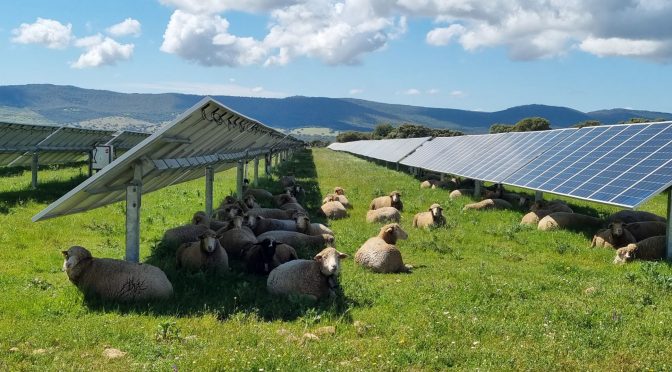The decree directly contradicts the guidelines of the Decree of Suitable Areas, whose publication was expected in June 2022, and the National Integrated Energy Climate Plan (PNIEC).
If the Agriculture Decree were approved without modifications, the objective of developing photovoltaic energy would become unattainable. Blocking these projects would not only prevent environmental goals from being achieved, but would also have a significant economic impact.
In 2022, there was a saving of around 25 billion euros in the cost of electricity thanks to the lower use of fossil fuels, which demonstrates the economic effectiveness of renewable energies. Furthermore, the construction of medium and large-sized ground-mounted PV systems is crucial to further reduce energy costs.
The press release states that tripling the renewable installations established in the G7 would require less than 1% of our country’s agricultural land, and that only 0.5% of agricultural land would be necessary to achieve the less ambitious REPowerEU objective.
A stable and favorable regulatory framework is necessary
FREE expects decisive intervention from the Presidency of the Council to prevent the decree from blocking the progress of new photovoltaic projects.
An open and constructive dialogue with the associations represented by FREE is essential to discuss these crucial issues, ensuring that Italy not only respects its environmental commitments but also promotes a sustainable economic model.
The energy transition industry is set to expand in Italy, creating new jobs and increasing national production capacity for renewable technologies. However, to achieve these objectives it is essential to have a stable and favorable regulatory framework.
the associations
The FREE coordination represents the associations: ADICONSUM – Italian Association for Consumer and Environmental Protection, AICARR – Italian Association of Air Conditioning, Heating and Refrigeration, AIEL – Italian Association of Agroforestry Energies, ANEV – National Wind Energy Association, ASS – Emission Free Heating Association, ASSISTAL – National Association of Manufacturers of Energy Efficient Plants and Services – ESCo and Facility Management, ASSOESCO – Italian Association of Energy Service Companies and Energy Efficiency Operators, ASSOPETROLI-ASSOENERGIA, ATER – Association of Renewable Energy Technicians, CIB – Italian Biogas and Gasification Consortium, CIA Veneto, FUTURE ELECTRICITY, FEDERIDROELETTRICA, FIRE – Italian Federation for the Rational Use of Energy, GBC ITALIA – Green Building Council Italia, GIGA – Informal Group for Geothermal Energy and the Environment, ISES Italia, ITABIA – Italian Biomass Association, ITALCOGEN, ITALIA Solare, KYOTO CLUB, NEW ENERGY – Puglia Production District, LEGAMBIENTE, Motus-E. Order of Engineers of Rome, Association “Yes to renewable energies, No to nuclear energy”, Bionet Green Chemistry, CITERA, CSI Piedmont, Department of Energy of the University of Palermo, GREENPEACE ITALIA, IRE Institute, MSA – Movement for Development of Alternative Energy, POLIMI, RE -CORD Florence, Sotto il Monte Solare, WWF ITALIA, Litro de Luz.
Legambiente Appeal on the Agricultural Decree
Legambiente also launched its appeal on the Agricultural Decree. Through its president Stefano Ciafani, the association raises important criticisms of the decree that imposes widespread restrictions on the installation of solar panels on agricultural land and the reorganization of the Forestry, Environmental and Agri-Food Unit Command (CUFAA) of the Carabinieri, which is expected to pass from the management of the Ministry of the Environment to that of Agriculture.
This transfer, according to Ciafani, could seriously compromise operations against environmental crimes in Italy. Furthermore, the decree does not address the real causes of the continuous consumption of agricultural land, mainly linked to new constructions. The association calls on Prime Minister Giorgia Meloni to immediately suspend the approval of the decree, underlining the importance of considering alternative approaches such as agrivoltaics, which allows coexistence between agri-food and energy production.


